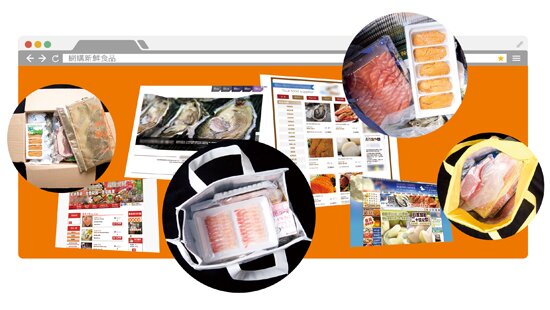Internet shopping has become a part of our daily life, meeting every needs of living in respect of clothing, food, housing and transport. Buying fresh food online has become very popular. The Consumer Council looked into the food categories, terms of service and delivery arrangement of more than 40 local online shops which sell fresh food. It is discovered that it is difficult to distinguish just from the shop's information and claims whether those shops have obtained a relevant licence, permission or registration. The online shops differ from each other in the practices of keeping purchased food chilled or frozen for delivery. The risk of food deterioration would increase if the process is conducted improperly.
Although there is no specific legislation to regulate online shops currently, depending on the mode of operation and the type of food sold, are regulated by the relevant laws. For example, they have to hold a Fresh Provision Shop Licence issued by the Food and Environmental Hygiene Department (FEHD) for selling fresh, chilled or frozen meat. Moreover, a written permission from the Director of Food and Environmental Hygiene is required for selling sashimi and oysters to be eaten in raw state. Of the online shops surveyed, some claimed themselves having the "Food Factory Licence" or "Food Factory Environmental Hygiene Licence", some claimed themselves to be food importers, dealers, etc., the others have not given any information on whether they held any relevant licences or permission.
Merely from the information available on the websites, it is not easy for consumers to tell whether the shops have the relevant licences or permission. During the period from last year to June this year, the FEHD has investigated more than 60 cases of online shops suspected to be unlicensed food businesses with 11 cases prosecuted as a result.
Nearly a hundred people in Hong Kong sustained food poisoning caused by the imported Taiwanese sandwiches in recent month and some of them had sourced the sandwiches online. The Council urges relevant government departments to step up surveillance of online food shops and conduct random tests on the foods they supply. The Council also calls for the industry to observe the law, ensuring food safety and operating with valid licences and permission, which have to be presented clearly on their website for consumers' information.
Besides the issue of licensing, delivery mechanism is another key study area. Of the 40-odd online shops surveyed, only 11 have clearly state the chilling/freezing arrangement for delivery, like "chilled goods will be kept at 10°C or below" or "frozen goods will be kept at -15°C". Some state that the food would be packed and delivered in an isothermic bag with ice pack. The others claim that food would be delivered by in-house refrigeration fleet or a courier company offering low-temperature/frozen food delivery service.
To understand the delivery arrangement by online shops and the food condition on arrival, the Council ordered some chilled and frozen food requiring low-temperature storage from 8 online shops as an ordinary consumer, including raw oysters, sashimi, frozen meat and cold pastries.
3 of the online shops surveyed delivered the order by persons claiming to be company staff. 4 online shops adopted the practice that, though the foods were ordered separately and different delivery time were selected, the foods ordered were delivered at the same time by the same courier company in 2 batches, each with foods ordered from 2 shops. 1 made the delivery by a delivery driver.
In respect of packaging, one shop packed salmon sashimi and frozen food in 2 separate isothermic bags, but the packaging of the salmon sashimi was found to be unsealed and could easily be unlidded. Besides, slight signs of defrosting were observed in the fruit sorbets ordered from the same shop. As for the other 7 online shops, 5 delivered the foods in isothermic bags with 1 to 3 ice packs, while the remaining 2 used a paper box with 1 ice pack. 4 of them managed to keep the food in good condition on arrival without obvious signs of defrosting. But for the other 3, some frozen meats started to defrost with blood oozing out. A box of frozen cream puffs was found to have the package distorted and the seal slightly opened.
Set aside the intrinsic quality of the product itself, the manner in handling each step from ordering to delivery, including packaging and chilling/freezing during transport, may affect the food quality and condition. All these are inter-related and improper handling in any step will increase the risk of food deterioration. Consumers should take the following into account when buying fresh food online.
- Be mindful of the background, reputation and operation of the online shop and the risks involved in delivery (such as the food has to be frozen), before placing order for perishable food through this channel.
- Sashimi is perishable and should be defrosted at 4°C or below. Susceptible groups such as young children, pregnant women and the elderly should avoid eating food not fully cooked.
- Raw oysters have high risk of microbiological and viral contamination which may lead to food poisoning. Consumers should purchase food from a reliable licensed food premises.
- Improperly stored meat can serve as a medium for the multiplication of bacteria which may cause food poisoning. Therefore, meat has to be thoroughly cooked before eating. Thawed meat should not be refrozen.
The Consumer Council reserves all its right (including copyright) in respect of CHOICE magazine and Online CHOICE (https://echoice.consumer.org.hk/).



